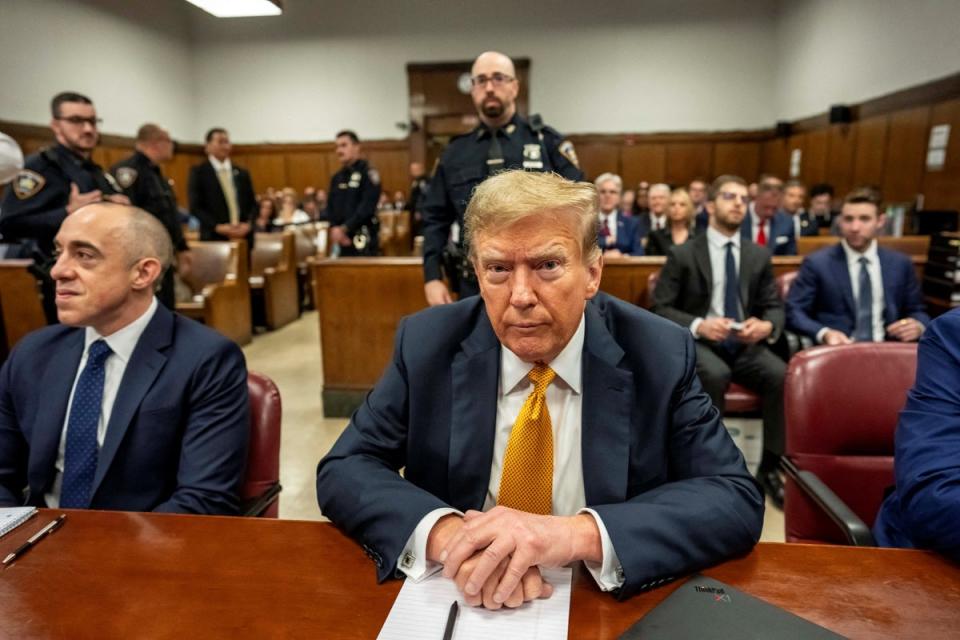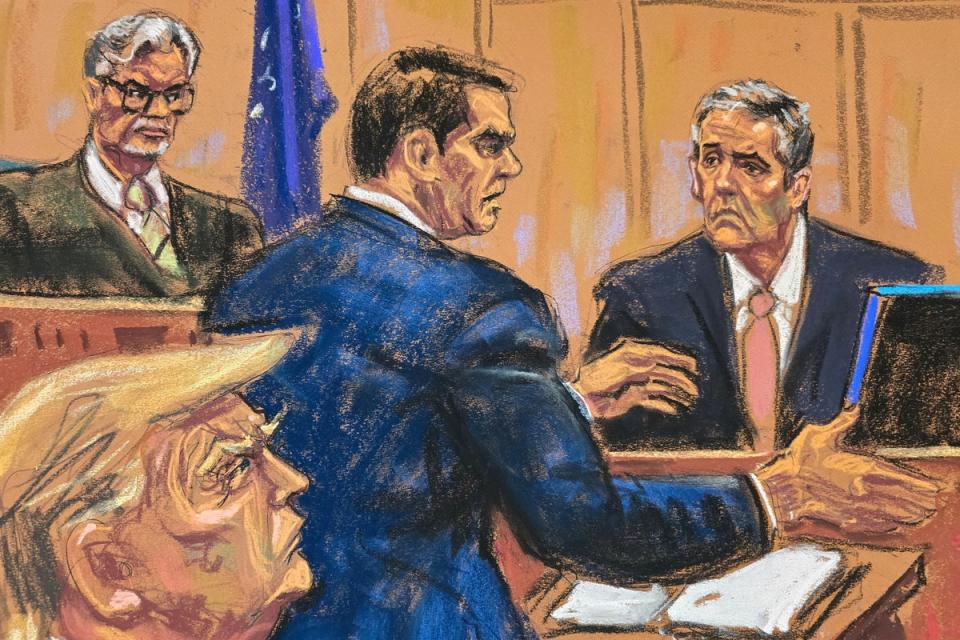Trump’s hush money trial is coming to an end. Here’s what to expect
- Oops!Something went wrong.Please try again later.
The first-ever criminal trial of an American president is now drawing to a close in Manhattan Criminal Court after five weeks of extraordinary testimony and courtroom antics.
Donald Trump is accused of 34 charges of the illegal falsification of business records to conceal a $130,000 payment to porn star Stormy Daniels one month before the 2016 presidential election, to ensure her silence about an alleged sexual encounter in 2006.
Mr Trump denies both the liaison and the charges against him.
Since 15 April, jurors have heard testimony from a string of colorful characters connected to the case, including Mr Trump’s former “fixer” Michael Cohen, ex-tabloid boss David Pecker and Ms Daniels herself.
Meanwhile, outside the court, the American public has heard Mr Trump give daily remarks to reporters, railing against the case and those involved.
But, when it came to Mr Trump’s chance to speak up on the witness stand, he backed out.
Now, both the prosecution and defense have rested their cases, with closing arguments held on Tuesday 28 May and the jury now into their deliberations to decide the fate of the former president.
With the trial nearing its end, here’s what to expect:
What if Trump is convicted?
Prosecutors have “stepped up” the misdemeanor crimes (falsification of business records) to felony status by arguing that he falsified documents in an effort to commit or conceal another crime. Those other alleged crimes include election conspiracy and campaign finance and tax law violations.

If convicted, Mr Trump could theoretically face more than a decade in prison.
The maximum sentence for each Class E felony count against him is four years in prison, which would add up to 136 years behind bars, although New York imposes a 20-year sentencing cap for this type of offence. A decision on whether the sentences run concurrently or consecutively would also be left up to the judge.
Given that Mr Trump has no prior criminal record and the alleged crimes are non-violent in nature, it is likely that he would face no jail time. Instead, New York Justice Juan Merchan could impose other penalties such as fines, probation or conditional discharge in lieu of jail time.
Mr Trump could of course be convicted of some of the 34 charges and acquitted on others.
Even if he doesn’t face jail time, a conviction could hurt Mr Trump’s chances in November. In an Reuters/Ipsos poll in April, one in four Republicans indicated that they would not vote for their party’s candidate if he were a convicted felon.
What if Trump is acquitted?
If Mr Trump is found not guilty of all charges, he cannot be retried for the same crimes.
This is because of the Fifth Amendment to the US Constitution’s Double Jeopardy Clause, which prohibits anyone from being prosecuted for the same crime twice.
What if there’s a hung jury?
Under New York law, criminal trials require the jury to reach a unanimous verdict to convict a defendant.
So, it would only take one dissenting voice among the jurors to leave the case on a hung jury.

If the disagreement is relatively close – for instance, if 11 are in agreement, with only one person holding out – New York Justice Juan Merchan would urge them to go away and resume their deliberations in the hope of finding common ground.
But if a consensus cannot be reached, the judge would be forced to call a mistrial.
In the event of a mistrial, Manhattan District Attorney Alvin Bragg would be able to retry the case.
It is also possible that the jury reaches consensus on some but not all of the charges, which could prompt the judge to accept a partial verdict. In that scenario, the prosecution could also retry Mr Trump on the charges.
When would he be sentenced?
If Mr Trump is convicted, Judge Merchan could choose to sentence him immediately or set a sentencing hearing for a later date.
Could Trump appeal?
Yes, Mr Trump could appeal the verdict.
Any initial appeal would first be heard by the First Department of the New York Supreme Court’s Appellate Division and, if that proves unsuccessful, he could then take the appeal to the New York Supreme Court.
An appeals process would be unlikely to wrap up before Election Day on 5 November.

